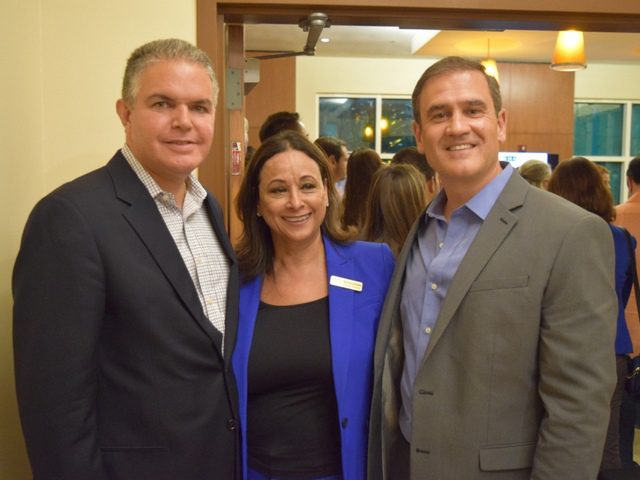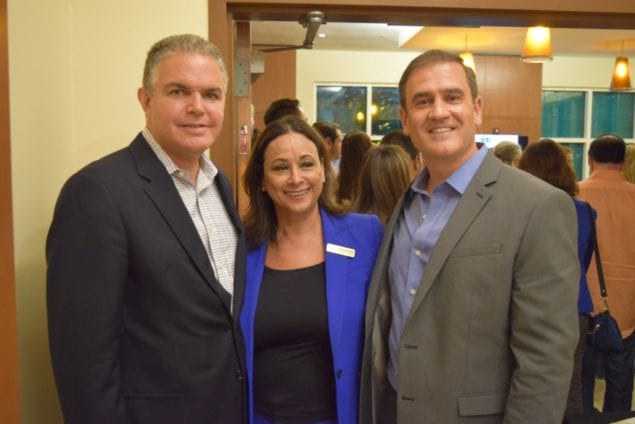In the early 1900s, civilization experienced the evolution from horse and buggy to the gas-powered automobile as the primary mode of transportation. Similarly, the world is now experiencing another major transformation of our transport system — from gasoline-powered vehicles to electric vehicles (EVs).
But with the changing face of life on the road as we know it, Brickell Energy president Alejandro Burgana says there are significant challenges that condo dwellers and their property managers must address in Miami’s growing Downtown-Brickell neighborhoods.
Burgana recently was invited to address members of the Brickell Homeowners Association (BHA), which represents more than 25,000 residential households living from the Miami River to the Rickenbacker Causeway, and from Biscayne Bay to I-95.
He spoke Feb. 28 before about 100 BHA members gathered at their monthly association meeting on the topic of “Electric Car Charging: Who Pays?”
While hosting residents and public officials, including Miami-Dade County Commissioner Bruno A. Barreiro, the BHA was presented with options by Brickell Energy that would help meet the growing demand for EV charging stations — and available and attractive financing packages — to serve the dozens of BHA member buildings in this growing neighborhood.
With Florida being the fourth largest market for electric vehicles and more than 50 percent of South Floridians living in condos and multi-family residences, Burgana warns that it is essential for multi-family condominiums to step up to offer EV charging.
“How your property sets up EV charging today, dictates how you set your property up for the future, when there are hundreds of EVs in your garage,” he said, adding that by addressing this growing trend now, EV drivers and property managers will be able to meet the demand for this amenity, as well as attract future EV drivers to their properties while “future-proofing” facilities and increasing their value.
It took seven years to sell the first million EVs in the U.S., but at current growth rates, the second million of EVs will come in a fraction of that time, he added.
“The time is now to prepare for the demands EV charging will place on parking facilities at condos and other commercial buildings,” Burgana said.
The presentation before the homeowners association was co-hosted by Park One of Florida (PK1), a local valet firm that has been front and center in helping associations find solutions to this challenge. The company serves as parking managers for more than 150 luxury condominium buildings in South Florida.
“We invited Mr. Burgana due to Brickell Energy’s commitment to offering the most compelling, smart, and affordable solutions in the market,” said Benton Launerts, PK1 regional vice president.
He noted that Burgana’s firm is becoming well known for facilitating the adoption of charging stations for host, station owners, fleet managers, and EV drivers all across Florida – and we wanted to go with a proven entity.
Burgana explained that this rapid transformation to EVs is now happening due to the convergence of three major factors: Advances in battery technology, environmental concerns, and innovative business models.
As outlined at the meeting, while there are three basic ways to implement a car charging station:
• Purchase and manage the asset and the service, which requires budget discussions and approvals, knowhow in managing the service, and brings subsequent exposure to equipment obsolescence;
• Let EV drivers within a community pay for their own conduit runs and charging equipment, which brings the dilemma of letting some residents tap into community electric panels for their own private use, and
• Implement community charging as a service, professionally managed by a third party, which reduces all the upfront and operational costs to the community, maximizes the benefit to all EV drivers, and eliminates the financial burden to those residents who choose not to drive electric.
Burgana strongly recommends the third option.
“Out of all programs out there, Brickell Energy’s top pick is the aFLoat charging as a service program, that pays for the charging equipment and installation, reimburses the community for electricity costs, and compensates the community for carbon credit income,” Burgana added.
“Just imagine the convenience of having a clean fuel station where you live, so you can wake up to a fully charged battery every morning,” he told homeowners. “Forget about trips to a gas station.”
The BHA meeting took place at Brickell on the River-North, a residential complex consisting of a 42-story North Tower and a 46-story South Tower located on the southern banks of the Miami River at 31 SE Fifth St.
For more information, contact Brickell Energy via email at sales@brickellenergy.com or by calling 305-546-5407. Also visit at www.brickellenergy.com.








